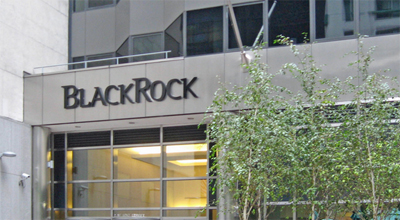Electric Revenge: Texas Sues BlackRock And Others For 'Conspiring' To Quash Coal, Sending Energy Prices Soaring
Tyler Durden
 Texas is leading a new lawsuit with 10 other red states against BlackRock, Vanguard and State Street for allegedly breaking antitrust law by colluding to suppress coal - causing electricity prices to spike. Texas is leading a new lawsuit with 10 other red states against BlackRock, Vanguard and State Street for allegedly breaking antitrust law by colluding to suppress coal - causing electricity prices to spike.
"Competitive markets — not the dictates of far-flung asset managers — should determine the price Americans pay for electricity," wrote Texas Attorney General Ken Paxton in the complaint.
The Republican-led states, including West Virginia and Montana, are asking the court to bar the three largest US investment firms from using their stock in coal companies to vote on shareholder resolutions and take other steps in a way that restrains output and limits market competition. -Bloomberg
The complaint, filed in Tyler, Texas, is one of the highest profile lawsuits targeting companies that promote environmental, social and governance goals, or ESH.
"Over several years, the three asset managers acquired substantial stockholdings in every significant publicly held coal producer in the United States, thereby gaining the power to control the policies of the coal companies. Using their combined influence over the coal market, the investment cartel collectively announced in 2021 their commitment to weaponize their shares to pressure the coal companies to accommodate "green energy" goals," the complaint continues.
"Blackrock, Vanguard, and State Street utilized the Climate Action 100 and the Net Zero Asset Managers Initiative to signal their mutual intent to reduce the output of thermal coal, which predictably increased the cost of electricity for Americans across the United States."
The 'cartel' is accused of "deliberately and artificially constricting supply," which "increased prices and enabled investment companies to produce extraordinary revenue gains."
The other states involved in the lawsuit are Alabama, Arkansas, Indiana, Iowa, Kansas, Missouri, Montana, Nebraska, West Virginia and Wyoming.
"Texas will not tolerate the illegal weaponization of the financial industry in service of a destructive, politicized 'environmental' agenda. BlackRock, Vanguard, and State Street formed a cartel to rig the coal market, artificially reduce the energy supply, and raise prices," said Paxton in a statement. "Their conspiracy has harmed American energy production and hurt consumers. This is a stunning violation of State and federal law."
The lawsuit follows years of investigation by GOP officials, who have taken aim at Wall Street's efforts to force a green agenda.
Specifically, the lawsuit accuses BlackRock, Vanguard and State Street of using their shareholdings in Peabody Energy Corp, Arch Resources, Inc. and others to press management to cut their carbon emissions starting in 2021 - at the height of the ESG boom, Bloomberg reports.
The firms also joined activist groups such as Climate Action 100+ and the Net Zero Asset Managers Initiative in which they formed "a syndicate and agreed to use their collective holdings of publicly traded coal companies to induce industry-wide output reductions."
The suit repeatedly refers to allegations that BlackRock, Vanguard and State Street have the power through their large shareholdings to constrain the supply of coal, which significantly diminishes competition in the market and produces “cartel-level profits” for the firms.
Climate-finance coalitions are “voluntary associations and therefore don’t include any form of collusion and coercion, so it’s hard to see a legal basis for this claim,” said Lisa Sachs, director of sustainable investment at Columbia University Law School. But “coal-financed politicians are now using the bully pulpit to scare financial institutions, which won’t in any way benefit the coal sector and will harm the constituents these AGs purport to represent.” -Bloomberg
That said, the firms have since reversed course - with State Street announcing in February that it quit Climate Action 100+ because its requirements were inconsistent with the firm's "independent approach" to shareholder voting. Vanguard left the Net Zero Asset Managers Initiative in 2022, however BlackRock and State Street remain members of the group.
Plaintiffs in the Texas lawsuit acknowledge the departures, but say that they don't "change the reality that defendants’ holdings threaten to substantially reduce competition in violation of Section 7 of the Clayton Act."
The case is Texas v. BlackRock, 24-cv-00437, US District Court, Eastern District of Texas (Tyler).
 our mission: our mission:
to widen the scope of financial, economic and political information available to the professional investing public.
to skeptically examine and, where necessary, attack the flaccid institution that financial journalism has become.
to liberate oppressed knowledge.
to provide analysis uninhibited by political constraint.
to facilitate information's unending quest for freedom.
our method: pseudonymous speech...
Anonymity is a shield from the tyranny of the majority. it thus exemplifies the purpose behind the bill of rights, and of the first amendment in particular: to protect unpopular individuals from retaliation-- and their ideas from suppression-- at the hand of an intolerant society.
...responsibly used.
The right to remain anonymous may be abused when it shields fraudulent conduct. but political speech by its nature will sometimes have unpalatable consequences, and, in general, our society accords greater weight to the value of free speech than to the dangers of its misuse.
Though often maligned (typically by those frustrated by an inability to engage in ad hominem attacks) anonymous speech has a long and storied history in the united states. used by the likes of mark twain (aka samuel langhorne clemens) to criticize common ignorance, and perhaps most famously by alexander hamilton, james madison and john jay (aka publius) to write the federalist papers, we think ourselves in good company in using one or another nom de plume. particularly in light of an emerging trend against vocalizing public dissent in the united states, we believe in the critical importance of anonymity and its role in dissident speech. like the economist magazine, we also believe that keeping authorship anonymous moves the focus of discussion to the content of speech and away from the speaker- as it should be. we believe not only that you should be comfortable with anonymous speech in such an environment, but that you should be suspicious of any speech that isn't.
www.zerohedge.com
|


